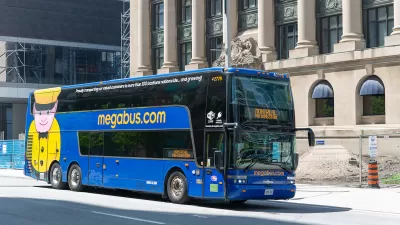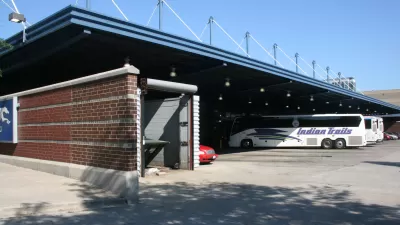Nonprofits often advocate for local transit spending, but when we gather, we seem to forget these values. How would we know what the transit of a given city is like if we never ride their buses?

Last May, I got my first glimpses of Louisville, Kentucky, from the windows of a public bus. As we crossed railroad bridges, passed a campus, and slid between blocks of neat Victorian homes, we learned from the bus driver about how many more jobs there were in Louisville compared to Toledo where she’d come from, and we chatted about the royal wedding. Approaching the hotel on foot from the bus stop two blocks away, I was welcomed by some of downtown Louisville’s ubiquitous street art, including gigantic walk-through bourbon barrel staves, and I got a quick look at the Ohio River before heading inside.
The 30-minute ride cost me $1.75, which for the penny-conscious nonprofit business traveler is a pretty good deal compared to a taxi, ride-hail, or airport shuttle.
I don’t know if I was the only attendee who arrived at that conference from the airport by bus, but I wouldn’t be surprised, given that neither the conference organizers nor the hotel listed it in their transportation from airport options. And they are not alone. In my eight years of attending at least half a dozen conferences a year, the number of conference logistics emails or travel FAQs [frequently-asked questions lists] that I’ve seen include information on bus routes from the airport is small, if indeed there were any.
FULL STORY: Taking the Bus: Nonprofit Conferences and Integrity of Purpose

Alabama: Trump Terminates Settlements for Black Communities Harmed By Raw Sewage
Trump deemed the landmark civil rights agreement “illegal DEI and environmental justice policy.”

Study: Maui’s Plan to Convert Vacation Rentals to Long-Term Housing Could Cause Nearly $1 Billion Economic Loss
The plan would reduce visitor accommodation by 25% resulting in 1,900 jobs lost.

Planetizen Federal Action Tracker
A weekly monitor of how Trump’s orders and actions are impacting planners and planning in America.

Wind Energy on the Rise Despite Federal Policy Reversal
The Trump administration is revoking federal support for renewable energy, but demand for new projects continues unabated.

Passengers Flock to Caltrain After Electrification
The new electric trains are running faster and more reliably, leading to strong ridership growth on the Bay Area rail system.

Texas Churches Rally Behind ‘Yes in God’s Back Yard’ Legislation
Religious leaders want the state to reduce zoning regulations to streamline leasing church-owned land to housing developers.
Urban Design for Planners 1: Software Tools
This six-course series explores essential urban design concepts using open source software and equips planners with the tools they need to participate fully in the urban design process.
Planning for Universal Design
Learn the tools for implementing Universal Design in planning regulations.
Caltrans
Smith Gee Studio
Institute for Housing and Urban Development Studies (IHS)
City of Grandview
Harvard GSD Executive Education
Toledo-Lucas County Plan Commissions
Salt Lake City
NYU Wagner Graduate School of Public Service





























